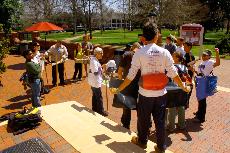An old man stands firmly in a crowd amidst his fellow farmworkers. His worn, stained hat might have once been white and his shirt has ‘FLOC (Farm Labor Organizing Committee)’ stamped across the front. He says not a word, but clutches a hand-made sign between his hands. “Could Your Family Live on $7500 a year?” it asks in large words. From March 28 to April 3, Guilford recognized National Farmworker Awareness Week with events organized by the International Club and Hispanos Unidos de Guilford.
These events included the Pilgrimage for Peace and Justice, Walk for Immigrant Justice, a showing of the Brothers Towns Film, a No More Deaths Presentation, and a Candlelight Vigil, and finished with the Immigration Simulation on Friday.
According to the Student Action with Farmworkers Web site, farmworkers provide food for the nation and the world, yet many are denied workers’ protection benefits, unemployment insurance, and paid overtime. Farmworker Awareness Week was founded for people to speak out against the injustice against farmworkers and help fight for their rights.
“I don’t think U.S. citizens know enough about our neighbor, Mexico,” said Engaged Teaching and Learning Specialist Judy Harvey, who had a part in inviting a speaker from the Mexico Solidarity Network. “I think it is really important for us to know more so that we can participate in the ongoing debate about immigration reform. Learning about farmworker issues and acknowledging what they contribute is one part of a very complex situation that all Americans need to know more about.”
Guilford’s Farmworker Awareness Week events focused largely on the mistreatment of Spanish-speaking immigrant farmworkers. According to the Students Action with Farmworkers fact sheet, “close to 90 percent of farmworkers are Spanish-speakers, the vast majority born in Mexico.”
Every year, thousands of immigrants trek across the harsh Arizona desert to cross the U.S.-Mexico border in the hope of finding a better life for their families. Almost every American is aware of this. However, it is almost impossible for many to realize the reality of that simple statement.
“The desert is not what people typically picture it to be, where the land is flat and you can see from miles around,” said junior Chesapeake First during the No More Deaths Presentation. “It is not flat. There are steep mountains that they have to climb, which makes it very dangerous.”
The majority of these immigrants seek jobs in agricultural work, where there is more job availability. Since they are not citizens of the United States, this leaves them vulnerable to jobs with poor pay, no benefits, and no security.
During spring break, over a dozen Guilford students participated in the No More Deaths group where they traveled to the U.S.-Mexico border to walk the trails that thousands of immigrants traveled to enter the United States. At the presentation, the students told their stories and described the border’s harsh reality..
“The efforts that the government has put toward (stopping immigrants from crossing into America) are to kill people,” said junior Maia Buess, a member of the No More Deaths Spring Break trip.
During the presentation, students learned how the United States deliberately narrowed the border, forcing immigrants to cross in areas with the most dangerous climates in order to reach the United States. The government deliberately did this so that more immigrants would be lost along the route to the border.
“Much like other government programs, this is kind of a farce,” Buess continued. “They talk about how certain organizations are in place to keep our country safe, but we all know that they don’t really do that. It doesn’t do anything effective except waste our money.”
Out of the thousands of immigrants who struggle to cross the border each year, at least a few hundred lose their lives due to the harsh terrain.
For more information about volunteer opportunities with No More Deaths, contact the Volunteer Coordinator at [email protected]’s theatre studies department presented “Curse of the Starving Class” on April 2 in Sternberger Auditorium. The play is one of Shepard’s “family” works, but those expecting gentle humor and Aesopian morals were disappointed.

